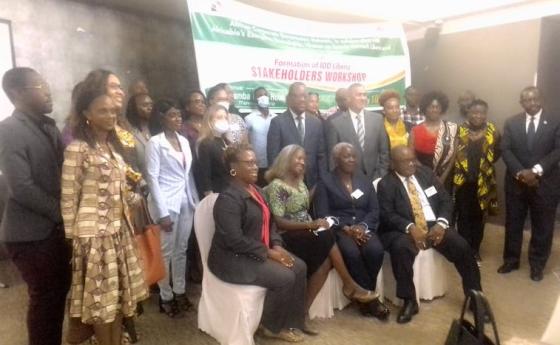ACGN Launches Institute of Directors in Liberia

Participants at the day-long workshop of Institute of Directors (IoD) in Monrovia, hosted by the African Corporate Governance Network (ACGN).
The African Corporate Governance Network has launched and commissioned the first ever Institute of Directors (IOD) to begin the process of a historic transformation for corporate institutions in Liberia, both public and private, to chart a new course of a more independent, accountable and productive nature.
The going may certainly not be an assured smooth ride but, with the involvement of counterparts from other African countries that are thriving well in their pursuit for a more vibrant, accountable and profitable system of governance within the corporate sector, Liberia, too, may rise to the occasion gradually.
Recently a number of private business executives and others from the public sector gathered at a hotel in Monrovia for a day-long workshop at which the Institute of Directors (IOD), an interim board of directors to steer the affairs of a continental corporate network — the first of its kind in Liberia — was launched and commissioned.
In his remarks as a special guest at the gathering, Monie Captan, chairman of the Liberia Electricity Corporation (LEC), said corporate governance can in no way escape political economy which often tends to undermine independent and merit-based value systems.
Captan said while the public corporate sector provides employment opportunities and public services, most times the opportunities are scarce and are usually vis-a-vis high in demand, but only the most privileged on political purpose benefit.
“Thus far more access to these scarce benefits may be tampered with by influence, meddling, patronage, or simply through transactional relationships,” he noted, adding, “Directors are mandated to ensure that such benefits accrue to the administration’s supporters, hence, the loyalty of the director tends to be directed to the appointing authority rather than the corporation. Anything contrary to this, they become accused of not working in the interest of the administration.”
The former chief executive officer of the US Millennium Challenge Compact Liberia Program reflected and disclosed that the late President William V.S. Tubman intentionally introduced the public relations program to the public and saw it run throughout on patronage bases.
“Although patronage was in existence before Tubman’s administration, it took strong political roots during Tubman’s era.
During the Liberian civil war and the power sharing government that was established, institutionalized structures were abandoned to accommodate the belligerent factions. The civil service was undermined, and the public sector became a means of creating personal wealth for those who get state power,” Captan explained.
He continued that “Post-war reforms have proven very challenging because patronage, over the years, has become a real deal for political governance and that revenue generating entities are usually the vehicles for patronage and, in such an environment, corporate governance is highly challenged.”
He called for real and tangible reforms so as to guarantee transparency and accountability in the public sector at all of its levels.
“New policies must be formulated, aimed at promoting institutional interest rather than individual interest. Competent executives must be employed and held accountable for their actions,” the LEC chairman said.
He raised concern over the unhindered power given the President of Liberia to appoint chief executive officers and boards of directors of all public entities operated under the watch of the Executive Branch of Government.
“This policy has weakened the value and importance of the board, thus slowing down quality service and accountable leadership. This is so because CEOs can provide directions and report directly to the President. Changing the narrative matters,” Captan said as he congratulated ACGN for the thoughtfulness about including Liberia in its project for transformative actions.
Madam Candace Eastman, the new head of the Liberia interim team of the Institute of Directors thanked the organizers of the workshop and assured them her full commitment to work with her colleagues, foreign partners, mainly those from the network of ACGN to help change the narrative of corporate governance in Liberia.
“It is an honor to accept this task. It is a huge task but certainly we are ready to focus on what corporate governance in Liberia is and promote it and conduct the business of the organization,” Eastman said.
She noted that while there is a lot of work at hand to be done in order to have a fully functioning and effective IOD program in Liberia, she will do all in her power to work with her colleagues to succeed.
Madam Eastman, whose other team members include Lilian Best, as vice chairperson and Mai Bright Urey as committee member, among others, said she will reach out to get the needed support for the sustainability of ACGN’s programs in Liberia.
Eastman is the chief executive officer (CEO) of Africabio Enterprises.
Rockson Dogbegah, Chairman of Africa Corporate Governance Network (ACGN) and President of Institute of Directors Ghana, as well as Chisanga Patrick, past President of IOD, Zambia, graced the occasion virtually and provided insightful messages.
Dogbegah admonished Eastman and her team to lead the formation process of IOD in Liberia, identify opportunities for training and capacity building as well as ensuring collaboration with other institutions both in public and private sectors.
He called on the Liberian interim IOD to organize democratic elections in not less than two years as of the day of the workshop that brought them into the interim office.
He told Eastman and her colleagues that they will not be working in isolation and, as such, they should be in close contact with the offices of ACGN in Ghana, Zambia, Zimbabwe and other African countries where the network’s programs are effectively working and succeeding.
